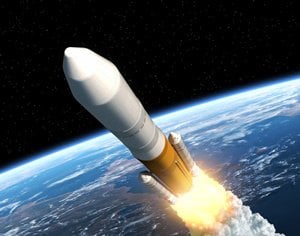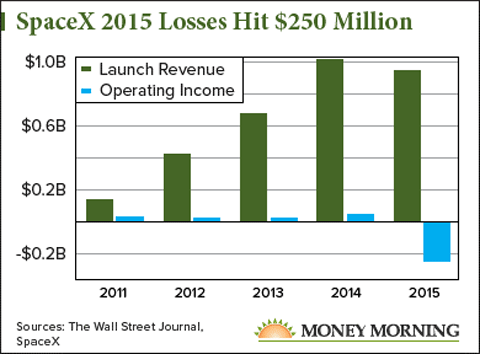In June 2015, SpaceX CEO Elon Musk said at a Tesla Inc. (Nasdaq: TSLA) shareholder meeting he intends to keep SpaceX private until its long-term goal of sending people to Mars begins. That's not expected until 2020 at the earliest, meaning investors shouldn't expect a SpaceX IPO until then.
 Once the company goes public, however, the SpaceX stock price will likely depend on the firm's ability to keep reusing rockets...
Once the company goes public, however, the SpaceX stock price will likely depend on the firm's ability to keep reusing rockets...
SpaceX was the first company to ever successfully launch and land a reusable rocket. That's important to potential investors because reusing rockets could reduce the cost of access to space "by as much as a factor of a hundred," according to Musk.
And SpaceX's ability to cut costs and turn a profit will determine how high the SpaceX stock price will go once it's public. Here's exactly why reusing rockets is essential to a higher SpaceX valuation, plus we'll show you the best way to profit from the SpaceX IPO after it goes public...
How Reusable Rockets Could Shape the Value of the SpaceX Stock Price
After accomplishing the first-ever launch of a reusable Falcon 9 rocket - the company's signature rocket used to ship supplies to the International Space Station (ISS) - on March 30, Musk embraced reusing rockets as the most cost-efficient way to get people to Mars.
"If one can figure out how to effectively reuse rockets just like airplanes, the cost of access to space will be reduced by as much as a factor of a hundred," he said on the company website. "That really is the fundamental breakthrough needed to revolutionize access to space."
Reusing a Falcon 9 refers to reusing its booster - the main engine of the rocket responsible for launching it into orbit. SpaceX is currently working on being able to recover and refurbish these boosters after their launches so the company can reuse them in future launches.
So far, SpaceX has only successfully launched three reused Falcon 9 boosters - the first on March 30 and two back-to-back launches on June 23 and June 25. While not all of SpaceX's boosters are reusable yet, Musk hopes to eventually launch each Falcon 9 with the intention of reusing its booster for a later launch.
Customers like the ISS and NASA pay $62 million for each non-reusable Falcon 9, according to the SpaceX website. But since Musk says a Falcon 9 booster makes up about 70% of the rocket's total production cost (note: SpaceX has not disclosed the total production cost of a Falcon 9), SpaceX would be able to reduce its costs and that $62 million price tag for clients by being able to reuse its boosters.
For example, it only costs around $200,000 to fuel each launch, according to the firm's website. That's roughly 0.4% of the $62 million launch price tag for clients - an indication of the cost-cutting potential of reusable rockets.
By reducing launch costs, the company will be both attracting more customers to buy launches for cheaper and saving millions since they won't need to construct an entirely new rocket for each launch.
And by saving millions on each launch by reusing boosters, SpaceX would be able to turn a profit again...
According to a report from The Wall Street Journal based on financial documents provided by former SpaceX employees, the company lost $250 million in 2015 despite launch revenue coming in above $900 million, as you can see in this chart...

Whether or not the company is able to maintain long-term reusability before the IPO, investors will still be eager to buy SpaceX stock when it first comes to market...
As of July 2017, SpaceX is the 10th highest-valued private company in the world, with a $1.1 billion valuation. Not to mention, SpaceX's goals of monetizing space travel could excite investors into buying the stock when it's available.
Trending: The 8 Most Anticipated IPOs of 2017
But you don't have to wait for SpaceX to go public to profit from the excitement around new IPOs. That's why Money Morning Director of Technology & Venture Capital Research Michael A. Robinson - a 34-year veteran of Silicon Valley who's worked as a consultant for venture capital firms - is recommending an investment that will let you profit from IPOs in 2017.
Here's how you can make money from newly public companies without the risk of buying in on day one...
The Best Investment for Making Money from New IPOs in 2017
[mmpazkzone name="in-story" network="9794" site="307044" id="137008" type="4"]
One of the safest ways to maximize gains and minimize risk from IPO investing is through the First Trust U.S. Equity Opportunities ETF (NYSE Arca: FPX), which will eventually hold SpaceX after it goes public in 2020 at the earliest.
Because it's an exchange-traded fund (ETF), retail investors can buy and sell FPX just like a regular stock.
And because FPX holds a mix of recent IPOs and well-established companies, it's diversified. That makes it less risky than owning just one stock.
It currently holds some of the most high-profile IPOs in recent years. These include Snap Inc. (NYSE: SNAP), Match Group Inc. (Nasdaq: MTCH), and Blue Buffalo Pet Products Inc. (Nasdaq: BUFF).
But it levels out the risk of new stocks by holding well-known companies like Tyson Foods Inc. (NYSE: TSN), The Kraft Heinz Co. (Nasdaq: KHC), and AbbVie Inc. (NYSE: ABBV).
For example, if FPX just owned shares of a recent IPO like SNAP, FPX would be down 39% so far in 2017. However, ABBV stock is up 15.4% so far in 2017, and it accounts for a much larger position in the fund than Snapchat.
In fact, AbbVie is First Trust's largest holding, consisting of 10.3% of its portfolio. In comparison, Snapchat only accounts for 1.2% of FPX's holdings.
And for investors looking to outperform the market with safe investments, FPX is beating the Dow Jones Industrial Average right now. The fund has gained 11.5% so far this year, while the Dow has only gained 9% in the same time.
The Bottom Line: With an ambitious goal to colonize Mars set by an even more ambitious CEO, SpaceX has no shortage of investor interest. Although Musk has said he doesn't plan on a SpaceX IPO until 2020 at the earliest, one thing that we know could influence the SpaceX stock price once it starts trading is the firm's rocket reusability initiative. If the firm is able to keep reusing Falcon 9 rockets, it will significantly cut costs and achieve profitability in the long term. But you don't have to wait to buy SpaceX stock to profit from exciting new IPOs. That's why we recommend investing in FPX. With a healthy mix of new and stable holdings, the First Trust ETF is one of the best ways to profit from the IPO market in 2017.
Must See: What do billionaires Peter Lynch, President Trump, and a retired cop from Northridge have in common? They've all benefitted enormously from a curious Great Depression-era "program." And even though most have no idea this exists, it could be worth $68,870 or more to the average American. Continue reading...


